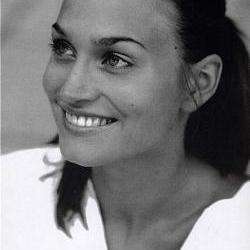Mieczysław Weinberg’s final opera is massive and unwieldy – it could hardly be otherwise, considering its basis. Fyodor Dostoevsky’s sprawlingly chaotic 1869 masterpiece, reworked by Alexander Medwedew into a passable libretto for Weinberg’s 1985 composition, centers on an open-hearted Prince, Lev Nikolayevich Myshkin, who genuinely desires the best for everyone in a terribly broken world which cannot comprehend kindness. It is a complex, introspective study of human psychology as well as a brutal societal critique, and no simple task to dramatize.
In Vasily Barkhatov's new production at MusikTheater an der Wien, the curtain opens on a long train, a stroke of genius by stage designer Christian Schmidt, atmospherically lit by Alexander Sivaev. This becomes an essential Leitmotif, underpinning the entire production. Beautifully directed, the train first introduces us to Myshkin, who is traveling to St Petersburg after being treated for intense epilepsy in Switzerland, but rotates throughout the evening into any number of settings and backdrops. The windows alternately reflect endless motion forwards through the winter landscape or reveal the interiority of characters, thanks to tasteful video projections by Christian Borchers. Throughout the evening we return again and again, Groundhog Day-style, to the opening scene on the train: two children playing catch; Myshkin dropping his cards and clutching a large sac; and Rogózhin, a young merchant violently smitten by the dazzling Nastasya, with the sneaky gossip Lébedyev never far away.
Myshkin is pulled into relationships with these and other dubious characters, who are most clearly united here in that they all sing absolutely fantastically, the savior of what could have been an overwhelming evening. The opera has a running time approaching three and a half hours, a difficult plot to grasp (the German supertitles to the Russian offer considerably more assistance than the appalling English translations) and a heavy score made almost completely of recitative-style dramatic scenes. There are precious few choral scenes (Arnold Schoenberg Chor) or discernible arias.
While this could easily feel interminable, the cast is a feast of Russian and Slavic voices to relish. The title protagonist, Dmitry Golovnin, whose brilliantly piercing tenor expressively rang and wailed throughout, balanced by the darker expressivity of Rogózhin (Dmitry Cheblykov)’s baritone. The two women fighting for his attention shone individually and blended beautifully in duet; Ekaterina Sannikova was a sparklingly attractive Nastasya with a soprano for the gods, while Ieva Prudnikovait, her rival, Aglaya, boasted a resonant, powerful mezzo, a force to be reckoned with. Of the rest, there was not a weak link to be found, from Petr Sokolov (Lébedyev) to the Epanchin family, played by Valery Gilmanov, Ksenia Vyaznikova, Tatjana Schneider and Bernadette Kizik, who are all interested in marrying their Aglaya to the prince for his wealth, not his character. Concurrently, Myshkin tries — unsuccessfully — to save Nastasya from nuptials with Ganya Ivolgin, played by Mihails Culpajevs, despite the objections of Ganya’s sister, Varja (Kamile Bonté).
It is difficult to fathom that a composer of Weinberg’s abilities was forgotten, but he is almost a perfect candidate for historical erasure. The Soviet composer was born in Poland in 1919; thanks to his Jewish heritage he found only tenuous footing, politically, throughout his life in Russia, and had scant chance of being welcomed musically by the West during the Cold War era. His musical idiom conjures an interesting blend of Shostakovich – with whom he had a long and productive collegial relationship – but also Hindemith.
There are enormously scaled moments with angular, unison walls of sound which crush under their acoustic weight, but also tiny, repetitive cell-like motifs which build and characterize entire scenes, nodding firmly to (expanded) tonality. The instrumentation of this, his final opera is rich, including a swath of percussion and a stage piano; the scene where Nastasya burns the stack of money meant to buy her fold in ragtime and dance hall brings hints of William Bolcom or Les Six. It is wonderful that Weinberg is enjoying a bit of a renaissance, with The Passenger premiering at the Bregenz Festspiele in 2010 and The Idiot enjoying its first full performance in Mannheim under Thomas Sanderling’s expert baton in 2013.
Sanderling brought out both the bombastic and the charm in Weinberg’s score, leading the ORF Radio-Symphonieorchester Wien with the good will and drive of an expert new-music ensemble recently saved from the chopping block in the eleventh hour. Happily, for now at least they can look to a more promising future in Vienna than Dostoevsky imagined for Nastasya.




